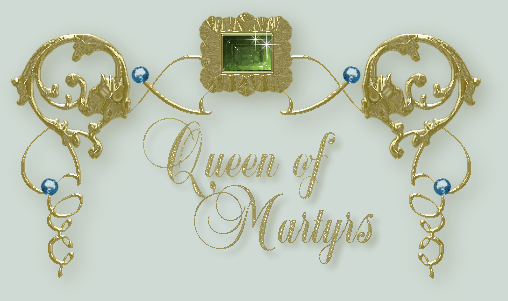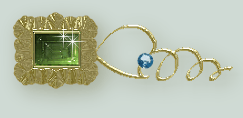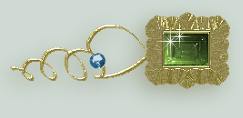V
The Death of Jesus on the Cross
We
have now to witness a new kind of Martyrdom---a Mother
condemned to see
an innocent Son, and One Whom she loves with the whole affection of her
soul, cruelly tormented and put to death before her own eyes.
There stood by the Cross
of
Jesus His Mother. [John xix. 25]
St. John believed that
in these words he had said enough of Mary's Martyrdom. Consider her at
the foot of the Cross in the presence of her dying Son, and then see if
there be a sorrow like unto her sorrow. Let us remain for awhile this
day on Calvary, and consider the fifth sword which, in the death of
Jesus, transfixed the heart of Mary.
As soon as our agonized Redeemer had reached the Mount of Calvary, the
executioners stripped Him of His clothes, and piercing His hands and
feet "not with sharp, but with blunt nails," as St. Bernard says, to
torment Him more, they fastened Him on the Cross. Having crucified Him,
they planted the Cross, and thus left Him to die. The executioners left
Him; but not so Mary. She then drew nearer to the Cross, to be present
at His death: "I did not leave Him" (thus the Blessed Virgin revealed
to St. Bridget), "but stood nearer to the Cross."
"But what did it avail thee, O Lady," says St. Bonaventure, "to go to
Calvary, and see this Son expire? Shame should have prevented thee; for
His disgrace was thine, since thou wert His Mother. At least, horror of
witnessing such a crime as the crucifixion of a God by His Own
creatures should have prevented thee from going there." But the same
Saint answers, "Ah, thy heart did not then think of its own sorrows,
but of the sufferings and death of thy dear Son," and therefore thou
wouldst thyself be present, at least to compassionate Him. "Ah, true
Mother," says the Abbot William, "most loving Mother, whom not even the
fear of death could separate from thy beloved Son!"
But, O God, what a cruel sight was it there to behold this Son in agony
on the Cross, and at its foot this Mother in agony, suffering all the
torments endured by her Son! Listen to the words in which Mary revealed
to St. Bridget the sorrowful state in which she saw her dying Son on
the Cross: "My dear Jesus was breathless, exhausted, and in His last
agony on the Cross; His eyes were sunk, half closed, and lifeless; His
lips hanging, and His mouth open; His cheeks hollow and drawn in; His
face elongated, His nose sharp, His countenance sad; His head had
fallen on His breast, His hair was black with Blood, His stomach
collapsed, His arms and legs stiff, and His whole body covered with
wounds and Blood."
All these sufferings of Jesus were also those of Mary; "Every torture
inflicted on the body of Jesus," says St. Jerome, "was a wound in the
heart of the Mother." "Whoever then was present on the Mount of
Calvary," says St. John Chrysostom, "might see two altars, on which two
great sacrifices were consummated; the one in the body of Jesus, the
other in the heart of Mary." Nay, better still may we say with St.
Bonaventure, "there was but one altar---that of the
Cross of the Son, on
which, together with His Divine Lamb, the victim, the Mother was also
sacrificed;" therefore the Saint asks this Mother, "O Lady, where art
thou? Near the Cross? Nay, rather, thou art on the Cross, crucified,
sacrificing thyself with thy Son." St. Augustine assures us of the
same thing: "The Cross and nails of the Son were, also those of His
Mother; with Christ crucified the Mother was also crucified." Yes;
for, as St. Bernard says, "Love inflicted on the heart of Mary the
tortures caused by nails in the body of Jesus." So much so, that, as
St. Bernardine writes, "At the same time that the Son sacrificed His
body, the Mother sacrificed her soul." Mothers ordinarily fly from
the presence of their dying children; but when a mother is obliged to
witness, such a scene,
she procures all possible relief for her child; she arranges his bed,
that he may be more at ease; she administers refreshments to him; and
thus the poor mother soothes her own grief. Ah, most afflicted of all
Mothers! O Mary, thou hast to witness the agony of thy dying Jesus; but
thou canst administer Him no relief. Mary heard her Son exclaim, I
thirst, but she could not even give Him a drop of water to
refresh Him
in that great thirst. She could only say, as St. Vincent Ferrer
remarks, "My Son, I have only the water of tears." She saw that on
that bed of torture her Son, suspended by three nails, could find no
repose; she would have clasped Him in her arms to give Him relief, or
that at least He might there have expired; but she could not. "In
vain," says St. Bernard, "did she extend her arms; they sank back empty
on her breast." She beheld that poor Son, Who in His sea of grief
sought consolation, as it was foretold by the prophet, but in vain: I
have trodden the winepress alone; I looked about and there was none to
help; I sought, and there was none to give aid. [Is.
lxiii. 3] But who amongst
men would console Him, since all were enemies? Even on the Cross He was
taunted and blasphemed on all sides: And
they that passed by, blasphemed Him,
wagging their heads. [Matt. xxvii. 39] Some said
to His face, If Thou be the Son of
God,
come down from the Cross." Others, He saved others, Himself He cannot
save. Again, If He be the
King of Israel, let Him now come down from
the Cross. Our Blessed Lady herself said to St. Bridget, "I
heard
some say that my Son was a thief; others, that He was an impostor;
others, that no one deserved death more than He did; and every word was
a new sword of grief to my heart."
But that which the most increased the sorrows which Mary endured
through compassion for her Son, was hearing Him complain on the Cross
that even His Eternal Father had abandoned Him: My God, My God, why
hast Thou forsaken Me? [Matt. xxvii. 46] Words
which the Divine Mother told the same St.
Bridget could never, during her whole life, depart from her mind. So
that the afflicted Mother saw her Jesus suffering on every side; she
desired to comfort Him, but could not.
That which grieved her the most was to see that she herself, by her
presence and sorrow, increased the sufferings of her Son. "The
grief," says St. Bernard," which filled Mary's heart, as a torrent
flowed into and embittered the heart of Jesus." "So much so,"
says
the same Saint, "that Jesus on the Cross suffered more from compassion
for His Mother than from His Own torments." He thus speaks in the name
of our Blessed Lady: "I stood with my eyes fixed on Him, and His on
me, and He grieved more for me than for Himself." And then, speaking
of Mary beside her dying Son, he says, "that she lived dying without
being able to die." Near the Cross of Christ His Mother stood
half-dead; she spoke not; dying she lived, and living she died; nor
could she die, for death was her very life."
Passino writes that Jesus Christ Himself one day, speaking to blessed
Baptista Varani of Camerino, assured her that when on the Cross, so
great was His affliction at seeing His Mother at His feet in so bitter
an anguish, that compassion for her caused Him to die without
consolation; so much so, that the Blessed Baptista, being
supernaturally enlightened as to the greatness of this suffering of
Jesus, exclaimed, "O Lord, tell me no more of this Thy sorrow, for I
can no longer bear it."
"All," says Simon of Cassia, "who then saw this Mother silent, and
not uttering a complaint in the midst of so great suffering, were
filled with astonishment." But if Mary's lips were silent, her heart
was not so, for she incessantly offered the life of her Son to the
Divine justice for our salvation. Therefore, we know that by the merits
of her dolors she cooperated in our birth to the life of grace; and
hence we are the children of her sorrows. "Christ," says Lanspergius,
"was pleased that she, the cooperatress in our redemption, and whom He
had determined to give us for our Mother, should be there present; for
it was at the foot of the Cross that she was to bring us, her children,
forth." If any consolation entered that sea of bitterness, the heart
of Mary, the only one was this, that she knew that by her sorrows she
was leading us to eternal salvation, as Jesus Himself revealed to St.
Bridget: "My Mother Mary, on account of her compassion and love, was
made the Mother of all in Heaven and on earth." And indeed these were
the last words with which Jesus bid her farewell before His death: this
was His last recommendation, leaving us to her for her children in the
person of St. John: Woman, behold
thy son. [John xix. 26] From that time Mary
began
to perform this good office of a mother for us; for St. Peter Damian
attests, "that by the prayers of Mary, who stood between the Cross of
the good thief and that of her Son, the thief was converted and saved,
and thereby she repaid a former service." For, as other authors also
relate, this thief had been kind to Jesus and Mary on their journey to
Egypt; and this same office the Blessed Virgin has ever continued, and
still continues, to perform.
EXAMPLE.
Blessed Joachim Piccolomini had always a most
tender
devotion for Mary,
and from his childhood was in the habit of visiting an image of our
Blessed Lady of Sorrows, which was in the neighboring church, three
times a day; and on Saturdays, in her honor, he abstained from all
food; and in addition to this he always rose at midnight to meditate on
her dolors. But let us see how abundantly this good Mother recompensed
him. In the first place, when he was a young man she appeared to him
and desired him to embrace the Order of the
Servites and this the holy young man did. Again, in the latter years of
his life she appeared to him with two crowns in her hands: the one was
composed of rubies, and this was to reward him for his compassion for
her sorrows; the other of pearls, as a recompense for his virginity,
which he vowed in her honor. Shortly before his death she once more
appeared to him; and then the Saint begged, as a favor, that he might
die on the same day on which Jesus Christ had expired. Our Blessed Lady
immediately gratified him, saying: "It is well: prepare thyself; for
tomorrow, Good Friday, thou shalt die suddenly as thou desirest;
tomorrow thou shalt be with me in Heaven." And so it was; for the next
day, during the singing of the Passion according to St. John, at the
words, Now there stood by the Cross
of Jesus His Mother, he fell into
the last struggles of death; and at the words, He bowed down His head
and expired, the Saint also breathed his last; and in the same
moment
the whole church was filled with an extraordinary light and most
delicious perfume!
Prayer.
Ah, Mother, the most sorrowful of all mothers, thy
son is,
then, dead;
that Son so amiable, and Who loved thee so much! Weep, then, for thou
hast reason to weep. Who can ever console thee? The thought alone
that Jesus by His death conquered Hell, opened Heaven until then
closed to men, and gained so many souls, can console thee. From that
throne of the Cross He will reign in so many hearts, which, conquered
by His love, will serve Him with love. Disdain not, in the mean time, O
my Mother, to keep me near thee, to weep with thee, since I have so
much reason to weep for the crimes by which I have offended Him. Ah,
Mother of Mercy, I hope, first, through the death of my Redeemer, and
then through thy sorrows, to obtain pardon and eternal salvation. Amen.
|


